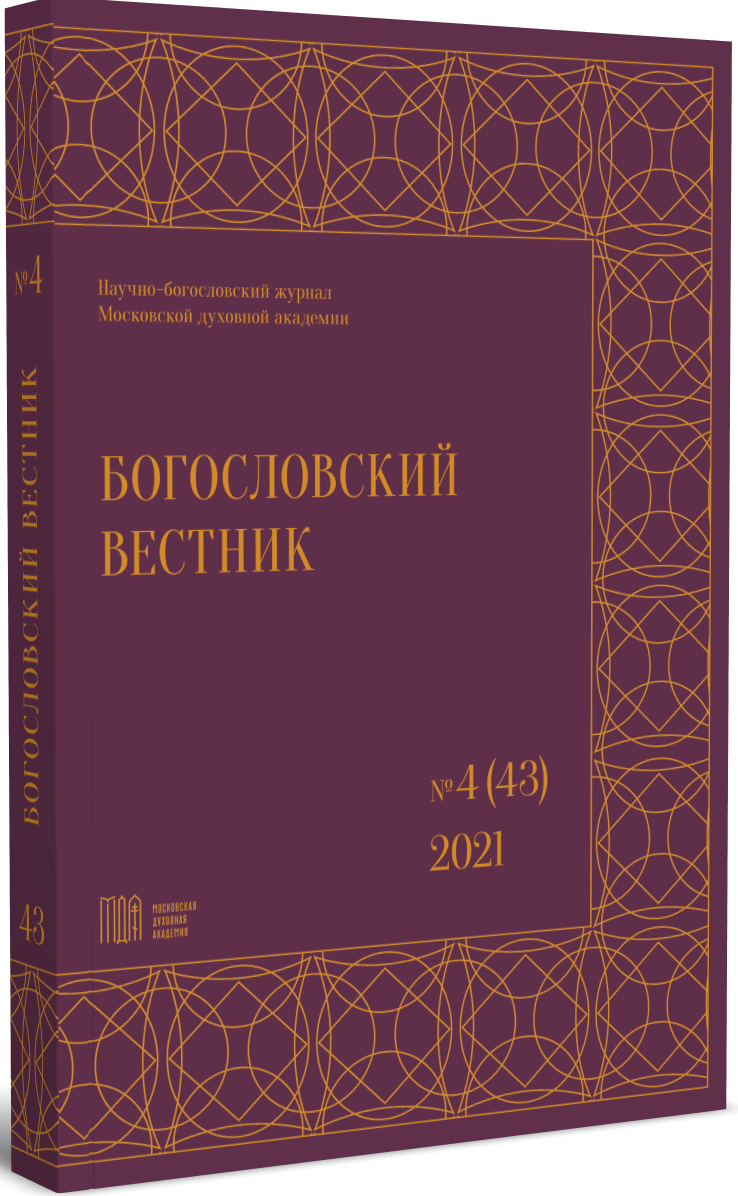Ambrosiaster: The History of the Appearance of the Name
DOI:
https://doi.org/10.31802/GB.2021.43.4.007Keywords:
Ambrosiaster, the Epistles of the Apostle Paul, exegesis, Latin Christian literature, the problem of authorshipAbstract
Increasingly, on the pages of Russian publications devoted to the study of the tradition of interpreting the Apostolic Epistles, one can find the name of the ancient Roman anonym Ambrosiaster. However, information about how this unusual name appeared in Latin patristics is often incomplete and distorted. This article contains the most reliable information from foreign research literature, in addition, describes the results of our own analysis of reminiscences of the Ambrosaster’s Commentary on the Epistle of Paul to the Romans in Latin writing. The analysis was carried out on the basis of the marker words methodology and the method of motivational analysis. The development of the question of the emergence of the name of Ambrosiaster is divided in the article into several stages: the attribution of his works by authors closes in time from saint Augustine to Cassiodorus; citation of his works by later Latin writers; development of the issue with the beginning of book printing. The article presents the most probable version of the appearance of the name Ambrosiaster.
Downloads
References
Ambrosiaster. Commentarius in epistulas Paulinas / ed. H. J. Vogels. Vindobonae: Hoelder-Pichler-Tempsky, 1966–1969. (CSEL; vol. 81/1–3).
Ambrosiaster. Contre les païens (Question sur l’Ancien et le Nouveau Testament 114) et Sur le destin (Question sur l’Ancien et le Nouveau Testament 115) / éd. M.-P. Bussières. Paris: Cerf, 2007. (SC; vol. 512).
Ambrosius Mediolanensis. Opera / ed. Desiderius Erasmus Roterodamus. Basle: Johann Froben, 1527.
Ambrosius Mediolanensis. Opera / ed. monachorum Ordinis S. Benedicti, è Congregatione S. Mauri. Paris: Coignard, 1686–1690.
Augustinus Hipponensis. De peccatorum meritis et remissione et de baptismo parvulorum, De spiritu et littera, De natura et gratia, De natura et origine animae, Contra duas epistulas Pelagianorum // CSEL. T. 60. P. 3–570.
Augustinus Hipponensis. Epistulae (ep. 82) // CSEL. T. 34/2. P. 351–387.
Cassiodorus. Institutiones / ed. Roger A. B. Mynors. Oxford: Clarendon, 1963.
Petrus Pictaviensis. Panegyriques // PL. T. 211. Col. 473–1067.
Зайцев Д. В. Амброзиастер // ПЭ. 2001. Т. 2. С. 104–108.
Baxter J. H. Ambrosiaster quoted as «Ambrose» in 405 // JTS. 1923. Vol. 24. P. 187.
Brugensis F. L. Notationes in Sacra Biblia, quibus, variantia discrepantibus exemplaribus loca, summo studio discutiuntur. Antuerpiae: Ex officina Christophori Plantini, 1580.
Cain А. In Ambrosiaster’s Shadow: A Critical Re-Evaluation of the Last Surviving Letter Exchange Between Pope Damasus and Jerome // Revue d’études augustiniennes et patristiques. 2005. Vol. 51 (2). P. 268–272.
Cassiodorus. «Institutions of Divine and Secular Learning» and «On the Soul» / transl. J. W. Halporn, introd. by M. Vessey. Liverpool: Liverpool University Press, 2004. P. 129. (Translated Texts for Historians; vol. 42).
Falluomini C. Der sogenannte Codex Carolinus von Wolfenbüttel (Codex Guelferbytanus 64 Weissenburgensis) mit besonderer Berücksichtigung der gotisch lateinischen Blätter (255, 256, 277, 280). Wiesbaden: Harrassowitz Verlag, 1999.
Hoven R. Notes sur Érasme et les auteurs anciens // L’Antiquité classique. 1969. Vol. 38. P. 169–174.
Hunter D. G. The Significance of Ambrosiaster // JECS. 2008. Vol. 17. P. 1–26.
Krans J. Who Coined the Name «Ambrosiaster»? // Paul, John, and Apocalyptic Eschatology / ed. J. Krans, M. C. d. Boer. Leiden; Boston (Mass.): Brill, 2013. P. 274–281.
Leeming B. Augustine, Ambrosiaster and the Massa Perditionis // Gregorianum. 1930. P. 58–91.
Newton F. The Scriptorium and Library at Monte Cassino, 1058–1105. Cambridge: Cambridge University Press, 1999. (Cambridge Studies in Palaeography and Codicology; vol. 7).
Simon R. Histoire critique des principaux commentateurs du Nou Veau Testament, Depuis le commencement du christianisme Jusques à nôtre tems: avec une dissertation critique sur les principaux actes manuscrits qui ont été citez dans les trois parties de cet ouvrage. Rotterdam: Chez Reinier Leers, 1693.
Souter A. A Study of Ambrosiaster. Cambridge: The University Press, 1905. (Text and Studies; vol. 7).
Veer A. C. Saint Augustin et l’Ambrosiaster // Premières polémiques contre Julien / ed. F.–J. Thonnard, E. Bleuzen, A. C. de Veer. Paris: Desclée de Brouwer, 1974. P. 817–824. (Bibliothèque Augustinienne; vol. 23).
Vogels H. J. Ambrosiaster und Hieronymus // Revue Bénédictine. 1956. Vol. 66. P. 14–19.
Vogels H. J. Die Überlieferung des Ambrosíaster Kommentars zu den paulinischen Briefen. Göttingen: Vandenhoeck und Ruprecht, 1959. (Nachrichten der Akademie der Wissenschaften in Göttingen, Philologisch-historische Klasse; Bd. 7).
Downloads
Published
How to Cite
License

This work is licensed under a Creative Commons Attribution-ShareAlike 4.0 International License.








